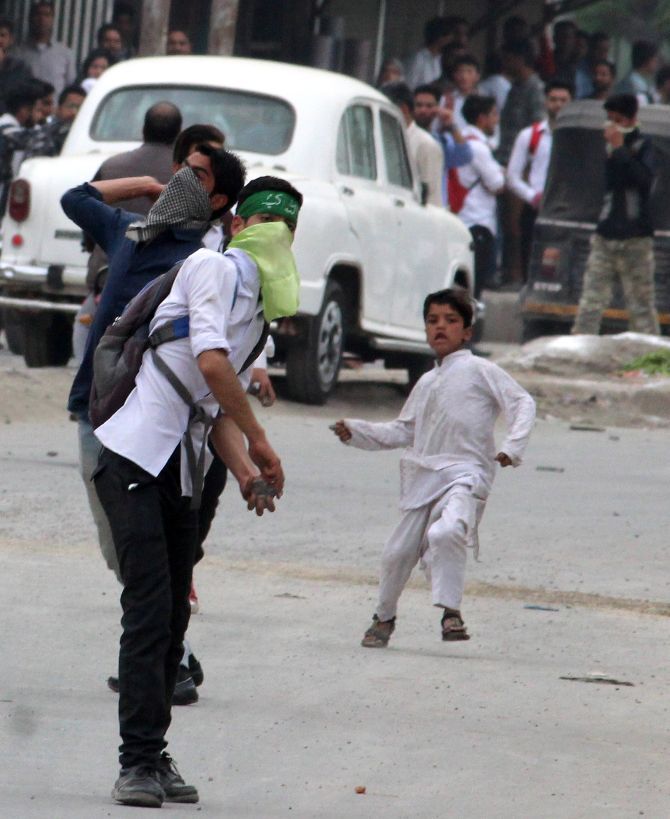 | « Back to article | Print this article |
'The political environment makes it extremely difficult for youngsters to be hopeful about their lives, and focus on their dreams.'

After graduating from IIT-Bombay in 2011 -- where he was the only Kashmiri in his batch -- Mubeen Masudi decided to move to Kashmir to do something impactful.
Although a Kashmiri, he had never lived in the state.
Concerned about the under representation of Kashmiris in reputed educational institutes, he left his job in Gurgaon and started RISE in 2012 with an aim to equalise educational opportunities for the students of Kashmir.
He spends most of his day mentoring young Kashmiri students in and around Srinagar, and has a finger on the pulse of the young, aspiring, Kashmiri.
His institute, which is helmed by two other IITians as well, is one of Kashmir's success stories. It provides coaching for IIT JEE and provides mentorship to young Kashmiri students with limited educational resources.
Two students from RISE have been selected to Ivy League universities this year.
Mubeen was awarded the Young Connectors of the Future Fellowship by the Swedish Institute, Stockholm in 2016 for his work at RISE. Additionally, he is also an Acumen India Fellow 2018.
"With the lack of representative leadership, and no space for moderates, the people have been pushed to the extreme, which has made achieving a middle ground even more difficult," he tells Rediff.com's Archana Masih in an e-mail interview.
Since your move to Srinagar, has the situation been as grim as it is now?
I am in Kashmir since 2012, the situation has been deteriorating since then.
A few months back I had a discussion with a renowned journalist in Kashmir. He pointed out the situation has been deteriorating since 2013, and the hanging of Afzal Guru was the inflexion point.
Ever since, with the BJP at the Centre, the lack of political steps to solve this conflict and only relying on the security apparatus worsened the situation
What has led to this situation?
Multiple things. Lack of any kind of political measures.
Ensuring the irrelevance of the moderate or separatist leadership, thereby pushing the youth to extreme ideologies.
And approaching Kashmir as a security problem and not as a political problem.
You meet a lot of young people every day, aspiring for careers and a better life. What do they feel and how does the situation affect their dreams?
The political environment makes it extremely difficult for youngsters to be hopeful about their lives, and focus on their dreams.
It has been like that for past many decades now. The current situation is no different.
What are your concerns as an ordinary citizen with the fall of the state government and the imposition of governor's rule?
In my opinion, it doesn't change anything for the Kashmir valley. So I don't have any concerns.
The damage has already been done in terms of radicalisation of youth, or pushing them to extremism, a process that began in 2013.
It may make a difference in the Jammu region which has seen growth and empowerment of communal forces due to the BJP's authority, as we saw in the aftermath of the Kathua case. So, I think it is good for the Jammu region.
Kashmir is essentially run and managed through a security prism. It doesn't matter who is in power.
What were your hopes when the PDP-BJP government came to power three years ago?
There was not much hope as the mainstream political parties haven't delivered in Kashmir historically. So the hopes from the government that was formed three years ago were minimal.
Although it was shocking to see PDP-BJP coalition as they are literally at the two extremes of the political spectrum.
Their compromise on their own bigoted values further diminished any kind of hopes that I had.
The environment of Kashmir is shaped by the party at Centre, so people in Kashmir didn't give much importance to the local government formed.
Although there was an element of fear with the BJP being in power in the state and Centre, which is perceived as an anti-Muslim party.
What was Mehbooba Mufti's failings as chief minister?
Her primary failing was compromising on her position and aligning with the BJP.
Her biggest failing was not doing anything when BJP ministers took out rallies in support of the rapists of an 8 year old.
It showed her to be very powerless, and someone only concerned about her power.
How has Kashmir changed under the PDP-BJP government?
Kashmir has changed more because of the BJP rule at the Centre and less because of the state government.
The central government has shrunk the space for moderates and the separatist leadership.
So there is hardly any 'leader' left to evolve a political solution to this long standing dispute.
With the lack of representative leadership, and no space for moderates, the people have been pushed to the extreme, which has made achieving a middle ground even more difficult.
How will the road be in the year ahead in Kashmir -- and in Jammu?
It won't be better. The situation will be the same or worse, especially because of the run-up to the elections.
I fear further polarisation is Jammu.
We saw in the aftermath of the Kathua case, the communally charged up atmosphere of Jammu.
The BJP has consolidated its voter base in Jammu, and will want to retain that, and in that process polarisation is feared.
How intense and grim is the radicalisation in the valley?
It is extremely grim.
As is the case with any other conflict zone in the world, the people -- especially the youth -- are getting radicalised and pushed to the extremes.
Until there is no political headway, the radicalisation, as I am seeing first hand, is only bound to increase.